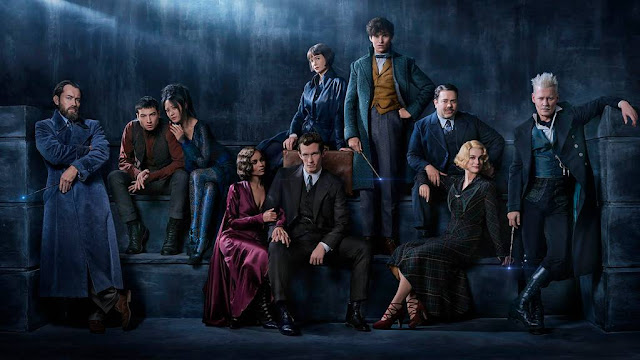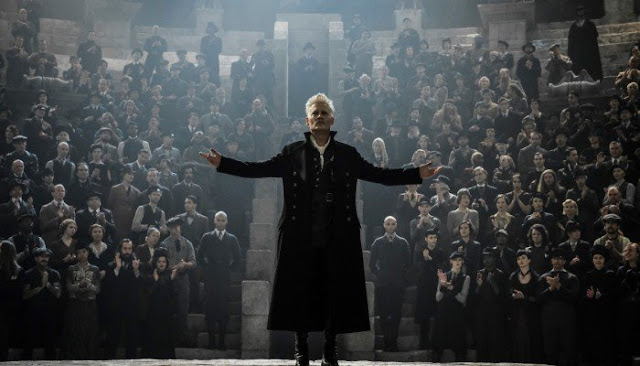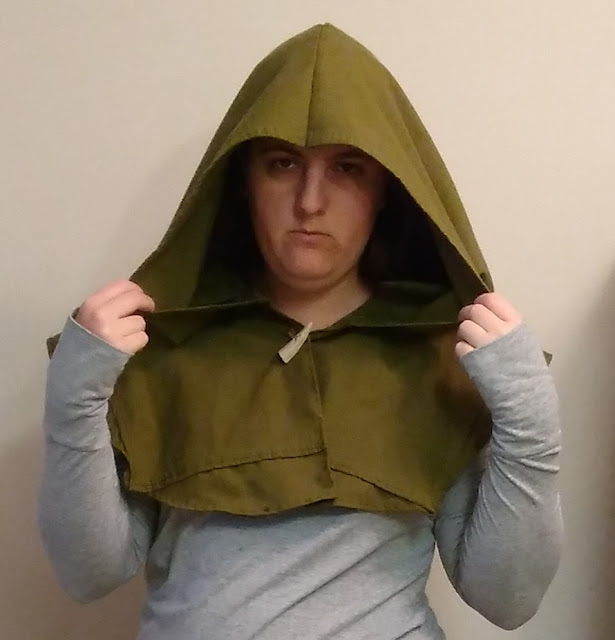Deconstruction: The Crimes of Grindelwald
So last Friday Starbat and I went to see The Crimes of Grindelwald in theatre. In short it's a great movie, and I definitely need to watch it about a dozen more times. Originally I was going to write a review here, but I realized this turned into more of a deconstruction of themes and impressions I got from the film and less about being a thorough and ranked review. And there's certainly a lot to unpack.
So warnings abound: Spoilers Ahead!
So warnings abound: Spoilers Ahead!
So Many Romantic Subplots
Merlin's beard there's a lot of romantically involved people in this movie. At the risk of sounding like a grumbling cynic, maybe too many? We've got Tina and Newt, Jacob and Queenie, Leta and Theseus, Credence and Nagini, Dumbledore and Grindelwald, etc. We get a little lost in the weeds of these relationships, to the point that it gets pretty romcom. Awkward meetings with crushes, misunderstandings, heated arguments, and...kidnapping? It's a bit like they needed to check off all the romcom tropes in one movie. And then wizard Hitler happens and things go really bad.
I wouldn't mind so much, but having Queenie go straight for coercing and kidnapping her boyfriend is more than a little disconcerting. It sets her up as being desperate and aggrieved of MACUSA's no-Maj policies, ready to hear a few persuasive words from Grindelwald, but it seems like a huge jump from the gentle, sensitive woman we meet in Fantastic Beasts. You would think a Legilimens would know better than anyone how people would feel if they were taken against their will. But then maybe that's the rub. She's, often unwittingly, the one who invades the privacy of others, and yet she herself has not experienced that same sort of invasion. And it might be why she's not on guard from that sort of subversion from Grindelwald, who's most likely have trained his mind against Legilimency. Was that the point?
Also, the fact that Tina's in Paris is the thing that drives Newt to buck the Ministry of Magic? Not the fact that the boy he protected in the first movie has bounty hunters and dark wizards on his track? I guess it supposed to be the combination of the two motivations that sets Newt Scamander on his quest, but it comes off as more the former than the latter. Which is a bit weird, but I can let that slide.
Dumbledore and Grindelwald
First off, well done in casting Jude Law as a young Albus Dumbledore. As with most of his work, Law brings to his performance great charisma and stage presence. With that familiar twinkling eye and some of the same mannerisms and speech patterns, it doesn't take much of a leap to see him as the younger version of Richard Harris' and Michael Gambon's Dumbledore, as a man already masking secrets and pain beneath a serene exterior. I'm actually a lot happier with this casting than I am with Johnny Depp as Gellert Grindelwald, though so far Depp's been doing better than I originally thought.
Anyway, odds are you're already aware that J.K. Rowling wrote Albus Dumbledore's character to be gay, and that if you scour the books there are certainly suggestions. This is especially evident in Harry Potter and the Deathly Hallows in the passages of Bathilda Bagshot describing Dumbledore's past interactions with Gellert Grindelwald. Of course this revelation caused a stir, and us Potterheads have wondered if this would be mentioned or explored in the upcoming movies. Although director David Yates said that this would not be a focus of this film, there was definitely more of this relationship suggested in Crimes of Grindelwald.
In the film it's made clear that both Dumbledore and Grindelwald are some of the most powerful wizards in the world. Grindelwald confirms this, speaking of Dumbledore as a major obstacle, but one that could be defeated by an Obscurial like Credence Barebone. But when others like Newt Scamander ask why Dumbledore doesn't confront Grindelwald himself, he simply says that he can't. In the course of the film, we see that this might be more than unwillingness. Grindelwald carries an amulet on his person that looks like it contains drops of blood, and in a scene of Dumbledore gazing in the Mirror of Erised we see a fairly intimate teenaged Dumbledore and Grindelwald making some sort of magical blood pact. Not quite the same as the Unbreakable Vow we see between Severus Snape and Narcissa Malfoy, but perhaps with a similar purpose. When Scamander's niffler friend recovers the amulet it's implied that this spelled object could be what prevents a Dumbledore-Grindelwald confrontation, though breaking it could be difficult.
We know that a confrontation between the two is inevitable. According to Dumbledore's chocolate frog card in Harry Potter and the Sorcerer's Stone, Dumbledore faces and captures Grindelwald in 1945. That's still a ways off from this film's setting in 1927, but I think it's pretty likely that this showdown will be the climax of the fifth film. But then how will Dumbledore break the amulet?
Here's my wild theory. That same chocolate frog card credits Dumbledore with discovering the twelve uses of dragon's blood. In various interviews with J.K. Rowling and scriptwriter Steve Kloves, three of those uses have been pegged as oven cleaner, spot remover, and a cure for verruca. Fairly mundane for the blood of a magical creature. But Rowling also states that she has reasons for not revealing all twelve, for the sake of her script writers. Perhaps she was withholding that the blood could also be used for breaking certain spells. And perhaps obtaining dragon's blood may be a plot point in a future film. After all, why have a film series about a magizoologist and never have a scene with dragons? The expertise of Nicolas Flamel would be very helpful, too. Yeah I know, wild theory.
Anyway, odds are you're already aware that J.K. Rowling wrote Albus Dumbledore's character to be gay, and that if you scour the books there are certainly suggestions. This is especially evident in Harry Potter and the Deathly Hallows in the passages of Bathilda Bagshot describing Dumbledore's past interactions with Gellert Grindelwald. Of course this revelation caused a stir, and us Potterheads have wondered if this would be mentioned or explored in the upcoming movies. Although director David Yates said that this would not be a focus of this film, there was definitely more of this relationship suggested in Crimes of Grindelwald.
In the film it's made clear that both Dumbledore and Grindelwald are some of the most powerful wizards in the world. Grindelwald confirms this, speaking of Dumbledore as a major obstacle, but one that could be defeated by an Obscurial like Credence Barebone. But when others like Newt Scamander ask why Dumbledore doesn't confront Grindelwald himself, he simply says that he can't. In the course of the film, we see that this might be more than unwillingness. Grindelwald carries an amulet on his person that looks like it contains drops of blood, and in a scene of Dumbledore gazing in the Mirror of Erised we see a fairly intimate teenaged Dumbledore and Grindelwald making some sort of magical blood pact. Not quite the same as the Unbreakable Vow we see between Severus Snape and Narcissa Malfoy, but perhaps with a similar purpose. When Scamander's niffler friend recovers the amulet it's implied that this spelled object could be what prevents a Dumbledore-Grindelwald confrontation, though breaking it could be difficult.
We know that a confrontation between the two is inevitable. According to Dumbledore's chocolate frog card in Harry Potter and the Sorcerer's Stone, Dumbledore faces and captures Grindelwald in 1945. That's still a ways off from this film's setting in 1927, but I think it's pretty likely that this showdown will be the climax of the fifth film. But then how will Dumbledore break the amulet?
Here's my wild theory. That same chocolate frog card credits Dumbledore with discovering the twelve uses of dragon's blood. In various interviews with J.K. Rowling and scriptwriter Steve Kloves, three of those uses have been pegged as oven cleaner, spot remover, and a cure for verruca. Fairly mundane for the blood of a magical creature. But Rowling also states that she has reasons for not revealing all twelve, for the sake of her script writers. Perhaps she was withholding that the blood could also be used for breaking certain spells. And perhaps obtaining dragon's blood may be a plot point in a future film. After all, why have a film series about a magizoologist and never have a scene with dragons? The expertise of Nicolas Flamel would be very helpful, too. Yeah I know, wild theory.
Purebloods
We thought we knew the pureblood community inside and out. But in this film more than any other, we see what makes them think the way they do. In Harry Potter we see how purebloods see themselves as superior, and how that translates into their snobbery, mistreatment of house elves, support of Voldemort, and deep-seated racism. We even see how Voldemort embraces his pureblood ancestry and simultaneously hates his Muggle roots, and that this self-hatred fuels his hatred of others. But in Crimes of Grindelwald, we see that at least some of this pureblood mania comes from a place of fear.
Let me explain. At Grindelwald's rally beneath the Lestrange family tomb, he brings forth the skull hookah thing that earlier showed Credence and his obscurus. The vision he shows to the gathered crowd shows the terrors of a new war, of tanks, people being herded, and finally the atom bomb. No magic, only the horrors of a Muggle-driven war. And especially Muggles mastering the atom bomb, a force so destructive that it actually rivals the most dangerous of spells. Could it be that these purebloods, so long convinced of their own superiority, actually feel threatened? That the status quo is changing, and that Muggle technology really could be considered the equal of magic? As much as Grindelwald strokes their egos, he also seems to reinforce this idea.
Fear of losing their dwindling pureblood lines. Fear that their own younger generations are turning into blood traitors, to intermarry with Muggles or Muggle-born. Fear of Muggle technology, and the possibility that their power is not so absolute and enduring as they believed. That's a whole lot of fear from some of the most powerful, entitled people around, to be used and manipulated by a charismatic leader fond of grand speeches and plenty of showmanship. Pretty spot on for wizard Hitler. And chilling to say that you can still see that kind of fear in the present day. Something to think about.
Credence as a Dumbledore
Although he was declared not-quite-dead in Fantastic Beasts, Credence Barebone plays a major role in Crimes of Grindelwald. After running off to join the circus, he apparently falls in love with the Maledictus Nagini, and escapes with her to seek out more information about his origins. After a lot of crumbs left about him potentially being the lost Corvus Lestrange, Leta Lestrange confesses that it could not be him because she inadvertently left Corvus to die. Grindelwald then tells Credence that he's no Lestrange, that his name is Aurelius Dumbledore and is a brother of Albus Dumbledore. He proves this by recounting that a phoenix will come to any Dumbledore in need, and that the small chick Credence has been taking care of is in fact a phoenix.
Pretty mind-blowing reveal, if true. The Dumbledore family has it's share of family drama and secrets, but we all assumed the most shocking had already been told in Harry Potter and the Deathly Hallows, with the story of Ariana, Aberforth, and Grindelwald. In the very least, the name Aurelius fits in with the A-name fits in with the other Dumbledore siblings.
But how likely is it that this is the truth? There's an argument to be made that this is just an elaborate con by Grindelwald. Earlier in the film, Grindelwald says to his followers that he has been laying out clues, a trail for Credence to follow that will bring him into Grindelwald's flock. Of course, every abandoned child wants an explanation for their suffering, and hope for a family somewhere, so this pureblood story is the perfect hook. And it redirects Credence's power away from hating Grindelwald, and towards hating Dumbledore. Grindelwald also avers that Credence as an Obscurial could kill Dumbledore, something that Grindelwald himself is either incapable or unwilling to do himself.
Loose Ends
Where to start? I think I'll have to rewatch this film a dozen times to get all the Easter eggs and hints toward the future. As with any good sequel, the idea is to expand the world we glimpse in the first film and give our characters a chance to develop. Unfortunately, it also means that we're back to where we were when we first started reading the books, of having to wait impatiently for the next installment to guess where we're headed next. So many intriguing new characters and ideas.
In new characters we have:
-Leta Lestrange
-Theseus Scamander
-Nagini, the Maledictus
-Nicolas Flamel
-Yusuf Kama
-The picture Flamel consulted, Ilvermorny professor Eulalie Hicks
-Grindelwald's silent and jodhpur-wearing henchwoman, Rosier
-Ministry of Magic bounty hunter Grimmson, to which Grindelwald promises fame and glory
And ideas and objects like:
-The skull hookah thing
-Blood pact pendant
-Prophecy of Tycho Dodonus
-French ministry cat spirit familiars
-The Dumbledore family and phoenixes
At the end of the movie, the battle lines have been drawn. Our heroes have been shaken, one of their number persuaded to join the dark side. But while they've already lost people, they've gained new allies in the fight in Nicolas Flamel, Yusuf Kama, Nagini, and Theseus Scamander, who I definitely make appearances in the next films. And while Credence has chosen to go with Grindelwald and been told a story about his "true heritage", it's still far from certain that he'll swallow it. Whatever happens, it'll be bound to be a good story!
All photo credits: The Crimes of Grindelwald









Comments
Post a Comment